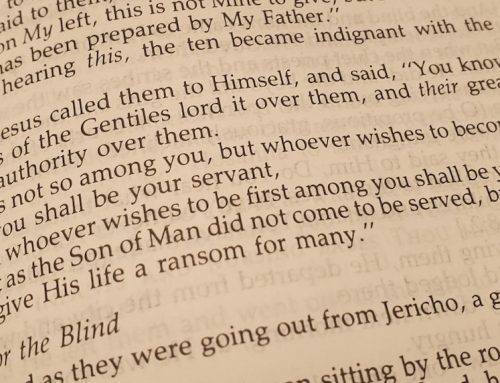I’ve realized over the course of writing this blog that the phrase “Doctrine of Christ” has been redefined by Stanton with meanings and connotations that the Bible never gives it. A church member at some point even felt compelled to write an anonymous blog entitled “What Is The Doctrine of Christ?,” taking it down after I linked to it. Perhaps you’ll find the true meaning of the term rather shocking in its simplicity, as I once did a number of years ago.
So let’s explore what John was really was saying in this passage:
2 John 9 – Whosoever transgresseth, and abideth not in the doctrine of Christ, hath not God. He that abideth in the doctrine of Christ, he hath both the Father and the Son.
Sounds pretty serious, so we better figure this out. If we abide in this doctrine–this teaching–we have both the Father and the Son. If we transgress, and choose not to abide in this teaching, we don’t have God. We even find out in the next verse that if anyone comes and does not bring this teaching, we’re not to “bid him godspeed” or even invite him into our house. So John is pretty passionate about this Doctrine of Christ, whatever it is. Hmmm. Perhaps that’s our first clue. But let’s proceed.
To unravel the mystery, let’s back up the truck and point out that John begs–that’s what beseech means–he begs that his readers follow the commands he wrote about from the very beginning. What were those commands?
2 John 5-6 – And now I beseech thee, lady [I beg you], not as though I wrote a new commandment unto thee, but that which we had from the beginning, that we love one another. 6 And this is love, that we walk after his commandments. This is the commandment, That, as ye have heard from the beginning, ye should walk in it.
His argument is curiously circular, but don’t get thrown off track by that. To John, love is “walking in his commandments,” and “walking in his commandments” is love. This is how John writes about love, over and over again, passionately, beautifully, and yes, redundantly. It is why many students of the Bible (outside of Stanton, at least) call the Apostle John the “Apostle of Love.” Apostle means “messenger.” John is without question the greatest Messenger of Love in the scriptures.
If you read all of John’s writings in one or two sittings, you’ll easily see that love was his passion. He made every effort to make sure Jesus’ message of love did not get lost on us by bringing it up incessantly every chance he got. John was no doubt one of those preachers that–you know–“always talks about love.” What a soft preacher, eh? To him, Love = Jesus’ Commands, and Jesus’ Commands = Love.
Not convinced of this circular proposition? Let’s look back at how John records Jesus’ commands:
John 14:15 – [Jesus speaking] “If you love me, you will obey what I command.”
John 14:20-24 – [Jesus speaking] “On that day you will realize that I am in my Father, and you are in me, and I am in you. 21 Whoever has my commands and keeps them is the one who loves me. The one who loves me will be loved by my Father, and I too will love them and show myself to them.” 22 Then Judas (not Judas Iscariot) said, “But, Lord, why do you intend to show yourself to us and not to the world?” 23 Jesus replied, “Anyone who loves me will obey my teaching [doctrine]. My Father will love them, and we will come to them and make our home with them. 24 Anyone who does not love me will not obey my teaching [doctrine]. These words you hear are not my own; they belong to the Father who sent me.”
John 15:10 – [Jesus speaking] “If you obey my commands, you will remain in my love, just as I have obeyed my Father’s commands and remain in his love.”
1 John 2:5 – But if anyone obeys his word, God’s love is truly made complete in him. This is how we know we are in him.
1 John 5:2-3 – This is how we know that we love the children of God: by loving God and carrying out his commands. This is love for God: to obey his commands. And his commands are not burdensome
These verses taken by themselves might give us the impression that Jesus’ Commands are comprised of some obscure list of rules and regulations that we have to deduce and induce, like lawyers, from the sum total of New Testament Scripture. But is that what he really meant?
Seriously, this isn’t a rhetorical question: What are Jesus’ commands? Have you ever thought about that? Do we really think Jesus’ commands included things like “don’t eat in a church building that I never even said to meet in in the first place?” (Yeah, that’s right, they met in homes.) Or “don’t buy wine, because that’s an appearance of evil,” when Jesus himself made it and drank it? (I think that’s a little slanderous of our Savior, myself.)
No, I suggest re-reading the gospels–the “authorized” history of Jesus’ life on Earth–to find out what Jesus’ commands are. Grab a notepad and write down all the commands you find from Jesus. This will clear your mind of the teachings of men. Let the Word speak for itself. I’ll let you draw your own conclusion, but I can tell you what the Apostle John understood to be Jesus’ primary commands, worth repeating time and again:
John 13:34-35 – [Jesus speaking] “A new command I give you: Love one another. As I have loved you, so you must love one another. By this all men will know that you are my disciples, if you love one another.”
John 15:12 – [Jesus speaking] “My command is this: Love each other as I have loved you.”
John 15:17 – [Jesus speaking] “This is my command: Love each other.”
1 John 3:11 – [John recounting Jesus’ teaching] This is the message you heard from the beginning: We should love one another.
1 John 3:23 – [John recounting Jesus’ teaching] And this is his command: to believe in the name of his Son, Jesus Christ, and to love one another as he commanded us.
1 John 4:16-17 – [John putting Jesus’ teaching into his own words] And so we know and rely on the love God has for us. God is love. Whoever lives [abides] in love lives in God, and God in him. In this way, love is made complete among us so that we will have confidence on the day of judgment, because in this world we are like him.
1 John 4:21 – [John recounting Jesus’ teaching] And he has given us this command: Whoever loves God must also love his brother.
2 John 1:5-6 – [John recounting Jesus’ teaching] And now, dear lady, I am not writing you a new command but one we have had from the beginning. I ask that we love one another. And this is love: that we walk in obedience to his commands. As you have heard from the beginning, his command is that you walk in love.
Do you really think we need a law degree to deduce and induce all of Jesus’ Commands from Scriptures (that were not even compiled into one volume for centuries), when John so clearly lays them out for us in so many different ways? If Jesus’ Commands were intended to be so clear to us that John would exort us over and over to follow them, walk in them, abide in them, don’t turn from them; shouldn’t we take notice that the only crystal-clear summary of them is Jesus’ Commands to love, expressed in various ways to various audiences? This Doctrine of Christ, my dear Watson–the teachings of Jesus Christ, that John was so adamant that we ought to abide in–looks an awful lot like Love.
Upon more examination, the following passages exhorting us to “abide in love,” “walk in the light,” and “abide in the light” look suspiciously parallel to the 2 John 9 passage we started off with, referencing this mysterious “Doctrine of Christ” we ought to be following. Let’s compare:
2 John 9 – Whosoever transgresseth, and abideth not in the doctrine of Christ, hath not God. He that abideth in the doctrine of Christ, he hath both the Father and the Son.
John 15:9-10 – As the Father hath loved me, so have I loved you: continue [abide] ye in my love. 10 If ye keep my commandments, ye shall abide in my love; even as I have kept my Father’s commandments, and abide in his love.
1 John 1:7 – But if we walk [abide] in the light, as he is in the light, we have fellowship one with another, and the blood of Jesus Christ his Son cleanseth us from all sin.
1 John 2:10 – He that loveth his brother abideth in the light, and there is none occasion of stumbling in him.
Which brings us full circle:
2 John 9-11 Whosoever transgresseth, and abideth not in the doctrine of Christ [i.e., whoever abides not in love, the central teaching of Jesus Christ], hath not God. He that abideth in the doctrine of Christ [i.e., whoever does abide/live/walk in love], he hath both the Father and the Son. 10 If there come any unto you, and bring not this doctrine [teaching], receive him not into your house, neither bid him God speed: 11 For he that biddeth him God speed is partaker of his evil deeds.
John sheds new light on this Doctrine of Christ, doesn’t he? Actually, it’s not new at all. As John so aptly points out, it’s just the same command we heard from the beginning, that we love one another, restated for emphasis.
How many times have we sung the words of the great old hymn “While his love burns true and bright, we are walking in light” without comprehending its meaning? I have to confess that I’ve become a little jealous that Laurene Highfield, who wrote that hymn, understood the centrality of the Doctrine of Love way back in 1916. Yes, truly, if God’s love is burning true and bright in our life, we are indeed walking in the light, aren’t we?
To the Apostle John, “walking in the light” (1 John 1:7) was in fact synonymous with “walking in love” (1 John 2:10), and Laurene Highfield got it. It may sound too good to be true, but LOVE is the shocking, life-changing, revolutionary Doctrine of Christ.







Kevin, I can't thank you enough. Although I've been indoctrinated with the church's idea of the doctrine of Christ for many years I believe I am starting to "get it". Your writings have caused me to re-examine every facet of my believe system and steer myself away from the doctrines of men to the simple, beautiful, powerful doctrine of Christ. God bless you.
You just brought tears to my eyes, brother…or sister. Thanks. 🙂
I 2nd Anon 3:12. Keep them coming.
Is all scripture inspired by God, profitable for (Doctrine)
Evidently you know the scripture in 2 Timothy 3:16
All scripture is given by inspiration of God, and is profitable for doctrine, for reproof, for correction, for instruction in righteousness:
It's most definitely inspired, meaning accurate as a result of divine guidance. That doesn't mean every statement in the Bible is true. For instance, the Bible records conversations of evil and/or uninspired people accurately, but what they really did say may or not be true. Job's wife told him to "curse God and die" and that wasn't "inspired" advice. A lot of people misunderstand what "inspired" means and use a false understanding of it to attack the Bible.
Ditto Anon 3:12. In my time in the SCOC I found the topic of love disdainful. Because I associated it with religion. But I am realizing there was no temperance in my life there. In the SCOC there are so many teachings on specific sins, rules, order, etc., that LOVE, while mentioned, really was not in balance to the bible's teachings. One search of "love" yields many more results than the topics aforementioned. But that balance won't be found in the SCOC, and it won't be found in me either. I see I'm going to have to work hard to… Read more »
This is a little off-topic, but I wonder if others were told "How many times in the bible does it have to be mentioned for it to be obeyed?" This seemed to be enough justification to make a bigger deal out of some things. Anyone else ever hear that?
I have never heard that particular criticism, but it is typical of the SCOC. The SCOC teaches in the pejorative, that is, from the point of contempt and disapproval. The only time I have heard any positive comments from the pulpit was when the "older ones" were being talked about. Those above the teacher walked on water, and those below the teacher were vile and wicked. No matter what you did it was never good enough, even if you did the same things as the teacher they would make up some criticism as to why you were wrong, even when… Read more »
I agree anon 9:52 I to would get the feeling no matter what you did, how hard you try you could've done better. A theme I believe it was.